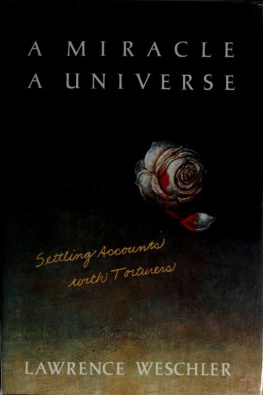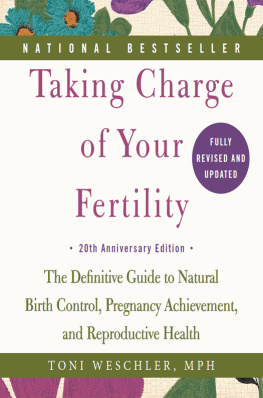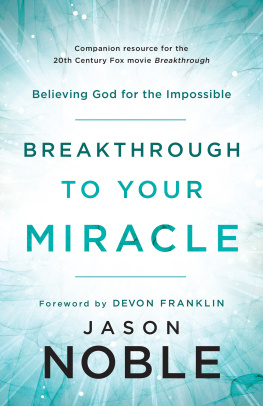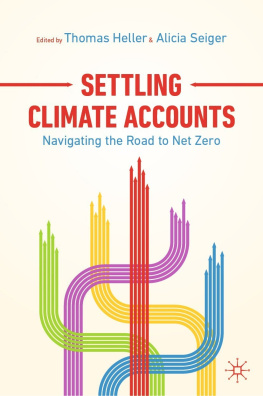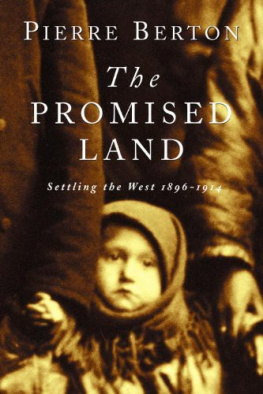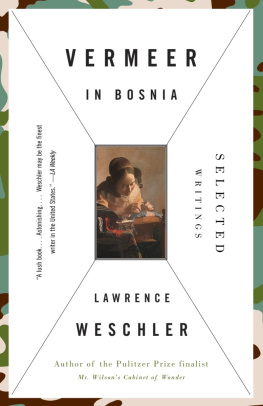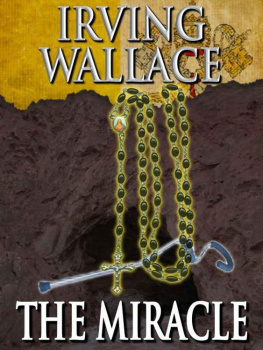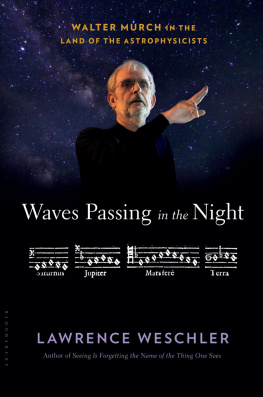Weschler - A miracle, a universe : settling accounts with torturers
Here you can read online Weschler - A miracle, a universe : settling accounts with torturers full text of the book (entire story) in english for free. Download pdf and epub, get meaning, cover and reviews about this ebook. year: 1990, publisher: New York : Pantheon Books, genre: Detective and thriller. Description of the work, (preface) as well as reviews are available. Best literature library LitArk.com created for fans of good reading and offers a wide selection of genres:
Romance novel
Science fiction
Adventure
Detective
Science
History
Home and family
Prose
Art
Politics
Computer
Non-fiction
Religion
Business
Children
Humor
Choose a favorite category and find really read worthwhile books. Enjoy immersion in the world of imagination, feel the emotions of the characters or learn something new for yourself, make an fascinating discovery.
- Book:A miracle, a universe : settling accounts with torturers
- Author:
- Publisher:New York : Pantheon Books
- Genre:
- Year:1990
- Rating:5 / 5
- Favourites:Add to favourites
- Your mark:
- 100
- 1
- 2
- 3
- 4
- 5
A miracle, a universe : settling accounts with torturers: summary, description and annotation
We offer to read an annotation, description, summary or preface (depends on what the author of the book "A miracle, a universe : settling accounts with torturers" wrote himself). If you haven't found the necessary information about the book — write in the comments, we will try to find it.
Weschler: author's other books
Who wrote A miracle, a universe : settling accounts with torturers? Find out the surname, the name of the author of the book and a list of all author's works by series.
A miracle, a universe : settling accounts with torturers — read online for free the complete book (whole text) full work
Below is the text of the book, divided by pages. System saving the place of the last page read, allows you to conveniently read the book "A miracle, a universe : settling accounts with torturers" online for free, without having to search again every time where you left off. Put a bookmark, and you can go to the page where you finished reading at any time.
Font size:
Interval:
Bookmark:

This book made available by the Internet Archive.






F.T.W.
(1928-1988)
A Living Wonder
Acknowledgments
In the first instance, once again, it was William Shawn, the editor of the New Yorker, who encouraged me to pursue this difficult and frightening topic, who allowed me to imagine I might not get permanently lost within it, and who in any case assured me that I'd have the space and time to struggle my way clear. As it happened, both the Brazil and Uruguay pieces actually appeared in the magazine after Mr. Shawn had left its helm. But the new editor, Robert Gottlieb, proved equally supportive and encouraging as I continued the work, and he helped see it through to completion. So that my first thanks go to both of them. Continuity was provided hereas in almost all the long pieces I've published in the magazineby my own editor, John Bennet, whose even temper, uncommon ear, and uncanny common sense as usual rendered the processing of these pieces almost more of an education for me than their original researching. Peter Canby handled the exas-peratingly tricky task of fact-checking the Brazil piece without ever seeming to show the slightest exasperation; Hal Hspen performed similar service, with equally impressive poise and dexterity, on the Uruguay
V 1 1
v i i i Acknowledgments
essays. Eleanor Gould, Elizabeth Macklin, Elizabeth Pearson-Griffiths, and Marcia van Meter all helped polish the prose during the final runup to publication in the magazine.
But it was Tom Engelhardt, my editor at Pantheon, who helped shape these essays into a bookwho helped me see the wider contours and then shape what we'd together seen. He's a uniquely gifted and centered reader, and it's a joy to be being read by him again.
There are several people I wish I could acknowledge from my stav in Brazila few of them I do mention by name in the bodv of the piece; the rest, however, didn't want me to mention their names at the time (for reasons which will become painfully clear), and I'm sure they wouldn't want me mentioning their names here either. I can, how ever, happily acknowledge the help of mv steadfast interpreter in Sao Paulo, Anita Wright.
In Uruguay, on my first trip, mv wife Joanna (seven months pregnant with our first child!) served as mv splendid and indefatigable interpreter; on mv second sortie, Patricia Pittman came over from Buenos Aires to fill in. In both cases, mere translation proved only the beginning of their contributions: much of the most valuable help came during the brief conversations we managed to squeeze in between interviewsevaluating what we'd just heard, anticipating what would come next, frantically revising our schedule, honing the questions, honing them further. The impress of their thinking and sensibilities is everywhere in these pages.
Many of the people who helped me most in coming to terms with the universe of issues involved in this complex and deeply troubling topic I quote at length in the pages that follow. However, I do want to express mv particular appreciation here for the contributions of Dr. Inge Kemp Genefke and her colleagues at the RCT in Denmark; Jaime and Alma Wright and Cardinal Arns in Sao Paulo; Marcelo and Maren Vignar, Eduardo Galeano, Juan Rial and Carina Perelli, Luis Gonzalez, Luis Perez Aguirre, and Jo-Marie Burt in Montevideo; and Jorge Reiner, Carlos Varela, Louise Popkin, Martin Weinstein, Elio Gaspari, Pepe Zalaquett, Elaine Scarry, A. J. Langguth, and Arveh Neier.
The John Simon Guggenheim Foundation extended me a fellowship at the outset of this workwhen it wasn't vet clear what sort of work this would beand that support proved catalytic.
My wife Joanna of course was invaluable in countless ways besides the merely linguistic. She is my sole support and my wise true friend. Finally, I need to mention our new daughter Sara, whose giggles and gurgles and bawlings and squirmings and snugglings and pleadings and wonderings and gazewhose burgeoning humanity (a miracle, a universe)haunted me through every hour of my work on these pages.
Miracle, Universe
Foreword * * *^* ^ ^ *
In the fall of 1988, a group of academics and lawyers and clerics and activists from countries as varied as Uganda, Argentina, South Korea, Chile, South Africa, Brazil, the Philippines, Guatemala, and Haiti gathered at the Aspen Institute's Wye Woods Conference Center, in Maryland, to try to puzzle through one of the most complicated issues facing polities all over the world as they try to move from dictatorial to democratic systems of governancethe question of what to do with former torturers still in their midst. In many cases, the receding security and military apparatuses, which were responsible for the preponderance of human-rights abuses during the previous regime, retain tremendous powerand they will not abide any settling of accounts. They demand blanket amnesties covering all violations committed during their tenure, amnesties designed to enforce a total amnesia regarding those crimes. The fledgling democracies thus face a harrowing challenge to a bulwark of their authoritythe very principle of equality before the lawjust as they are attempting to consolidate their rule.
over and over again, as the participants at the Aspen Institute conference began to realize, the same two imperatives seem to rise to the fore the intertwined demands for justice and for truth. The security forces, of course, will abide neither, but if anything the desire for truth is often more urgently felt by the victims of torture than the desire for justice. People don't necessarily insist that the former torturers go to jailthere's been enough of jailbut they do want to see the truth established. Fragile, tentative democracies time and again hurl themselves toward an abyss, struggling over this issue of truth. It's a myste-riouslv powerful, almost magical notion, because often everyone already knows the trutheveryone knows who the torturers were and what they did, the torturers know that everyone knows, and everyone knows that they know. Why, then, this need to risk everything to render that knowledge explicit?
The participants at the Aspen Institute conference worried this question around the table several timesthe distinctions here seemed particularly slippery and elusiveuntil Thomas Nagel, a professor of philosophv and law at New York University, almost stumbled upon an answer. "It's the difference," Nagel said haltingly, "between knowledge and acknowledgment. It's what happens and can only happen to knowledge when it becomes officially sanctioned, when it is made part of the public cognitive scene." Yes, several of the panelists agreed. And that transformation, offered another participant, is sacramental.
**^^*^*^
Font size:
Interval:
Bookmark:
Similar books «A miracle, a universe : settling accounts with torturers»
Look at similar books to A miracle, a universe : settling accounts with torturers. We have selected literature similar in name and meaning in the hope of providing readers with more options to find new, interesting, not yet read works.
Discussion, reviews of the book A miracle, a universe : settling accounts with torturers and just readers' own opinions. Leave your comments, write what you think about the work, its meaning or the main characters. Specify what exactly you liked and what you didn't like, and why you think so.

